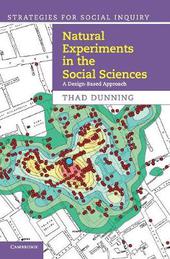
|
Natural Experiments in the Social Sciences: A Design-Based Approach
Hardback
Main Details
| Title |
Natural Experiments in the Social Sciences: A Design-Based Approach
|
| Authors and Contributors |
By (author) Thad Dunning
|
| Series | Strategies for Social Inquiry |
|---|
| Physical Properties |
| Format:Hardback | | Pages:380 | | Dimensions(mm): Height 249,Width 175 |
|
| ISBN/Barcode |
9781107017665
|
| Classifications | Dewey:300.724 |
|---|
| Audience | | Tertiary Education (US: College) | |
|---|
| Illustrations |
14 Tables, black and white; 13 Line drawings, black and white
|
|
Publishing Details |
| Publisher |
Cambridge University Press
|
| Imprint |
Cambridge University Press
|
| Publication Date |
6 September 2012 |
| Publication Country |
United Kingdom
|
Description
This unique book is the first comprehensive guide to the discovery, analysis, and evaluation of natural experiments - an increasingly popular methodology in the social sciences. Thad Dunning provides an introduction to key issues in causal inference, including model specification, and emphasizes the importance of strong research design over complex statistical analysis. Surveying many examples of standard natural experiments, regression-discontinuity designs, and instrumental-variables designs, Dunning highlights both the strengths and potential weaknesses of these methods, aiding researchers in better harnessing the promise of natural experiments while avoiding the pitfalls. Dunning also demonstrates the contribution of qualitative methods to natural experiments and proposes new ways to integrate qualitative and quantitative techniques. Chapters complete with exercises and appendices covering specialized topics such as cluster-randomized natural experiments, make this an ideal teaching tool as well as a valuable book for professional researchers.
Author Biography
Thad Dunning is Associate Professor of Political Science at Yale University and a research fellow at Yale's Institution for Social and Policy Studies and the Whitney and Betty MacMillan Center for International and Area Studies. He has written on a range of methodological topics, including impact evaluation, econometric corrections for selection effects and multi-method research in the social sciences, and his first book, Crude Democracy: Natural Resource Wealth and Political Regimes (Cambridge University Press, 2008), won the Best Book Award from the Comparative Democratization Section of the American Political Science Association.
Reviews'Dunning has produced a useful and remarkably accessible guide for social scientists of all sorts. I especially like his guide to discovering natural experiments.' J. D. Angrist, Massachusetts Institute of Technology 'One of the most exciting developments in contemporary political science is the use of natural experiments to estimate causal effects. In this illuminating and highly readable book, Thad Dunning provides an expert guide to the strengths and weaknesses of this cutting-edge method, demonstrating how researchers can use natural experiments as a powerful tool for causal inference while avoiding common mistakes. I recommend this book to both beginning and experienced researchers.' Alan S. Gerber, Charles C. and Dorathea S. Dilley Professor of Political Science, Yale University 'The biggest problem social scientists face is figuring out what causes what. Does economic growth cause peace or is it the other way round? Do people adopt the values of their friends or just gravitate to others that think like them? Most of the time these questions are unanswerable but every now and then there's a chink in nature's armor. A windfall or crisis throws an economy off course, a fire or flood forces people into new social networks. Natural experimentalists seek out such moments to shine a light on underlying orders. But, as Dunning shows, the natural experimentalist's path is treacherous. In this first serious treatment of natural experiments in social science, Dunning sets down standards and shares techniques to help ensure real learning from such rare moments.' Macartan Humphreys, Columbia University 'A remarkable synthesis not just of how to do empirical work, but how to do social science. Indispensable.' James Robinson, David Florence Professor of Government, Harvard University
|